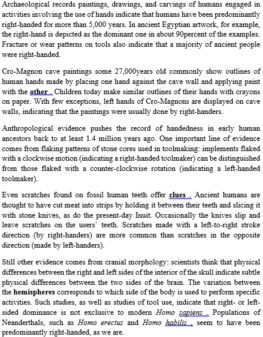* Read the following passage and mark the letter A, B, C, or D on your answer sheet to indicate the correct answer to each of the questions from 24 to 30.
Thirty years ago, Lake Ponkapog in Hartwell, New Jersey, was full of life. Many birds and animals lived beside the water, which was full of fish. Now there are few birds, animals, and fish. The lake water is polluted. It is a dirty brown colour, and it is filled with strange plants.
How did this happen? First, we must think about how water gets into Lake Ponkapog. When it rains, water comes into the lake from all around. In the past, there were woods all around Lake Ponkapog, so the rainwater was clean.
Now there are many homes on the lake shore. People often use the chemicals in their gardens. They use other chemicals inside their houses for cleaning and killing insects. There are also many businesses. Businesses use chemicals in their machines or stores. Other chemicals fall onto the ground from cars or trucks. When it rains, the rainwater flows by these homes and businesses. It picks up all the chemicals and then pours them into the lake. They pollute the water and kill the animal life.
There is still another problem at the lake: exotic plants. These plants come from other countries. They have no natural enemies here, and they grow very quickly. In a short time, they can fill up a lake. Then there is no room for other plants. The plants that normally grow there die. These plants gave many animals and fish their foods or their homes. So now those animals and fish die, too.
People in Hartwell are worried. They love their lake and want to save it. Will it be possible? A clean lake must have clean rainwater going into it. Clean rainwater is possible only if people are more careful about chemicals at home and at work. They must also be more careful about gas and oil and other chemicals on the ground.
(“Reading Power ” by Beatrice S. Mikulecky/Linda Jeffries - Longman)
Exotic plants grow quickly because they___________.
A. make the water dirty
B. have no natural enemies
C. are large and strong
D. have a lot of water

















